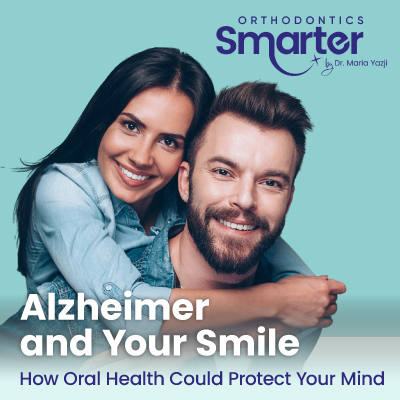
Over the past decade, scientists have uncovered a surprising and potentially life-changing connection between gum disease and Alzheimer’s. While research is still ongoing, the evidence is strong enough to make one thing clear: keeping your mouth healthy may be one of the best investments you can make for your brain.
At Smarter Orthodontics, with offices in Miami, Brickell, and Weston, we’ve always known that oral health is key to overall well-being. But the latest science is showing that a healthy smile could go far beyond looking great; it could help protect your memory for years to come.
The science behind the mouth-brain connection
In 2019, researchers from the University of Louisville made headlines with a study that pointed to a surprising suspect in the Alzheimer’s mystery: Porphyromonas gingivalis, the main bacteria responsible for chronic gum disease.
In their research, they discovered P. gingivalis in the brains of people who had died with Alzheimer’s. Even more striking, experiments in mice showed that when the bacteria infected the mouth, it was later found in the brain, along with an increase in amyloid-beta, the sticky protein that forms plaques commonly associated with Alzheimer’s disease.
The team also found toxic enzymes called gingipains, produced by the bacteria, in the brains of Alzheimer’s patients. These enzymes were linked to other hallmarks of the disease, such as tau protein tangles. But perhaps the most important detail was this: gingipains were also found in the brains of people who had not yet been diagnosed with Alzheimer’s.
This suggests something critical: gum disease may not be a result of Alzheimer’s, but rather an early contributing factor. As the researchers put it, brain infection with P. gingivalis could be an “early event” that starts the chain reaction leading to cognitive decline.
What other research says
The link between oral bacteria and brain health isn’t limited to one study. At the University of Exeter, scientists examined the mouth bacteria of over 100 volunteers aged 50 and older. They found that certain bacteria, such as Neisseria and Haemophilus, were associated with better memory and attention. Others, especially Porphyromonas, were linked to poorer brain health and a higher risk of Alzheimer’s.
While the study is still in its early stages, it suggests that the balance of bacteria in our mouths could influence how well our brains age. Lead researcher Dr. Joanna L’Heureux noted that one day, a simple mouth rinse sample could help predict someone’s Alzheimer’s risk, well before symptoms appear.
The takeaway? Oral bacteria may be doing more than affecting your gums and teeth; they could be influencing your brain function, memory, and long-term cognitive health.
Why gum health matters for your whole body
Gum disease, also called periodontal disease, isn’t just about bad breath or bleeding gums. Left untreated, it can lead to tooth loss, bone damage, and serious infections. But more importantly, the bacteria involved can travel through your bloodstream and affect other organs, including your heart and brain.
The inflammation caused by gum disease is also a problem. Chronic inflammation has been linked to a wide range of health issues, from diabetes to cardiovascular disease, and now, possibly Alzheimer’s.
Maintaining healthy gums means:
- Brushing twice a day with fluoride toothpaste
- Flossing daily to remove plaque between teeth
- Using an antimicrobial mouth rinse if recommended by your dentist
- Eating a balanced diet rich in vegetables and low in processed sugar
- Visiting your dentist regularly for check-ups and cleanings
At Smarter Orthodontics, we emphasize prevention because once gum disease progresses, it can be much harder to reverse. Early detection is the key, not just for your smile, but for your long-term health.
How can aligned teeth help prevent disease?
You might be wondering, what does tooth alignment have to do with gum disease and Alzheimer’s risk? The answer is simple: straighter teeth are easier to clean.
When teeth are crowded or misaligned, it’s harder to reach all the surfaces with a toothbrush or floss. This can lead to plaque build-up in hard-to-reach spots, creating a perfect environment for harmful bacteria like P. gingivalis to thrive.
That’s why orthodontic treatments, such as braces or Invisalign®, aren’t just about aesthetics. By aligning your teeth, you make it easier to keep them clean, reduce the risk of gum disease, and ultimately protect your overall health.
Whether you choose the precision of Invisalign®’s clear aligners or the proven results of traditional braces, the benefits go beyond a beautiful smile. You’re also setting yourself up for better oral hygiene and possibly a healthier brain.
Smarter Orthodontics: caring for your smile and your health
With locations in Miami, Brickell, and Weston, our team at Smarter Orthodontics is dedicated to helping patients achieve both a healthy smile and a healthier future. We believe that orthodontic care is more than just straight teeth; it’s about creating the conditions for lifelong oral and overall health.
We stay informed on the latest scientific research because we care about the whole patient, not just their smile. When you visit us, you’re not just getting orthodontic expertise, you’re getting a partner in your overall wellness.
The bottom line
While scientists are still exploring the exact link between gum disease and Alzheimer’s, the message is clear: taking care of your mouth is an essential part of caring for your brain.
Daily brushing and flossing, regular dental visits, a healthy diet, and, if needed, orthodontic treatment can all work together to reduce your risk of gum disease. And by reducing gum disease, you may be reducing your risk of much more serious conditions down the road.
Your smile isn’t just about confidence; it could be about your long-term brain health.
Take the first step today.
Book your complimentary consultation at Smarter Orthodontics in Miami, Brickell, or Weston, and let’s work together toward a smile that’s not only beautiful, but healthy from the inside out.
